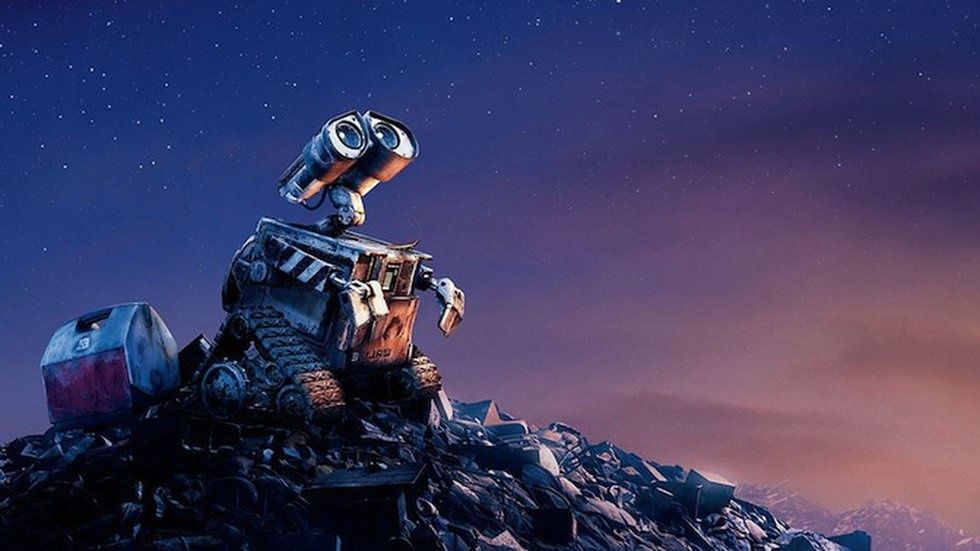In Pixar's "WALL-E", the wordless exposition, dull tones, and soundscape are reminiscent of silent films. The empty sound of the barren and abandoned city introduces the lonely protagonist. The key issue with our protagonist, from the perspective of his creators, is to express the emotions and thoughts of WALL-E without elocution. Instead, through use of alluring cinematography and poignant film score, the audience feels the depth of WALL-E's, and other droid's, emotions thus empathizing with the protagonist(s).
Empathy for the protagonist is key for film in general, but especially so in "WALL-E", since the audience is asked to watch the story unfold from WALL-E's cute, robotic, eyes. To achieve this goal, the cinematographer often decides to have the 'camera' point into WALL-E's eyes so that the audience is shown the image of what WALL-E is looking at in the reflection. This tool is especially crucial during the inciting incident when Eve's ship lands and WALL-E falls into jaw-dropping infatuation. This angle into the reflection of his eyes, gives the audience that feel of his love for Eve. Another example of creative use of 'camera' angles in the movie is in the space-dancing scene, where WALL-E saves the plant from the escape pod's auto-destruct, and with the fire extinguisher, he and Eve dance among the stars. During this sequence the 'camera' utilizes many far-away, wide-angle shots of the characters gracefully gliding in symmetrical and twisting paths that visually demonstrates the unity of two separate 'people'. The fact that these shots are so far away lets the audience realize that the actual characters themselves become less important, and the concept of the grace and beauty within companionship and love is the true subject on display for the audience to engage with.
Similarly, the way that cinematography can draw emphasis towards point of view as well as the motifs of the film, the score is a more noticeable and heavy-handed method for indicating to the audience key aspects of the protagonist's character and mood. In the exposition, the slow tempo of the song playing over the scene of WALL-E zipping through the city, along with the way that the music seems to echo and resound off the tall, grey buildings elicits a tone of desolation in order to mirror WALL-E's loneliness. The feel of this music speaks for WALL-E's emotions and inner thoughts helping to animate him along with his chirps and beeps. Another notable aspect of the music within the film is the heavy use of musical montages to explore the budding relationship between Eve and WALL-E, giving WALL-E a chance to demonstrate his love for Eve by taking care of her while she's in her hibernation mode. All of these montages are set to 50s-60s era love songs, helping the audience to empathize with, and root for WALL-E to woo Eve. Lastly, the decision to pull "The Blue Danube" and "Thus Sprach Zarathustra" from the score of 2001: A Space Odyssey helped to give key insights into the theme of the movie. While "The Blue Danube" plays in the space-dancing scene, the mood is light-hearted and graceful, mirroring the budding love and child-like wonder between Eve and WALL-E and the motif in the grace of that love. Similarly, when "Thus Sprach Zarathustra" plays overhead as the Captain takes his first steps in order to stop Auto and save WALL-E, it takes the context of evolution from 2001, and implants that into this film to show the climax of the Captain's story arc and how the humans as a whole are now taking back their will from their robotic creations.
In summation, two of the most striking components of the film were the subtle yet powerful effects of a carefully curated musical score as well as simplistic and creative cinematography. In order to achieve this goal of building an empathetic connection between audience and protagonist, these tools act as a voice for WALL-E and offer the observant viewer insight and foreshadowing towards the film's thematic elements. Without this creativity from the film's music and cinematography teams, the cute, kind, and loving nature of the film's titular character would go shamefully unsung.
















